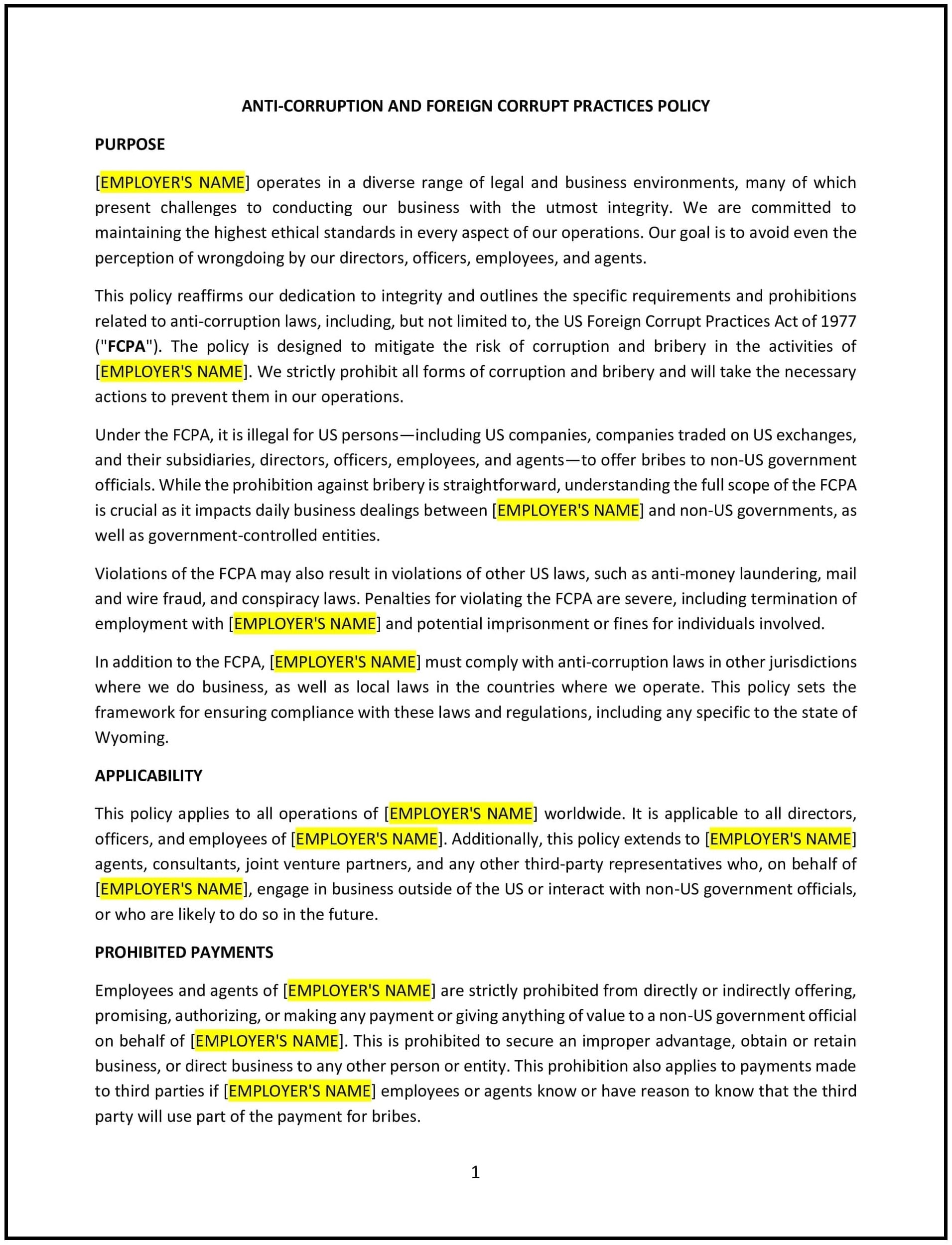Anti-corruption and foreign corrupt practices policy (Wyoming): Free template
Got contracts to review? While you're here for policies, let Cobrief make contract review effortless—start your free review now.

Customize this template for free
Anti-corruption and foreign corrupt practices policy (Wyoming)
In Wyoming, an anti-corruption and foreign corrupt practices policy outlines the business’s commitment to ethical practices and compliance with laws prohibiting bribery and corruption, including the Foreign Corrupt Practices Act (FCPA). This policy provides guidelines for preventing and addressing corruption risks, particularly in interactions with government officials or foreign entities. By adopting this policy, businesses can safeguard their reputation, mitigate legal risks, and promote a culture of integrity.
How to use this anti-corruption and foreign corrupt practices policy (Wyoming)
- Define prohibited actions: Clearly state that bribery, facilitation payments, and other forms of corruption are strictly prohibited in all business dealings.
- Address gifts and entertainment: Set guidelines for providing or accepting gifts, meals, or entertainment, ensuring they do not violate anti-corruption laws or business ethics.
- Implement due diligence: Require thorough due diligence on third parties, such as agents, vendors, or consultants, to ensure they adhere to anti-corruption standards.
- Provide reporting mechanisms: Establish confidential channels for employees to report suspected corruption or unethical practices without fear of retaliation.
- Train employees: Offer regular training on anti-corruption laws, company policies, and identifying risks to ensure employees understand their responsibilities.
- Monitor and audit: Conduct periodic reviews and audits of business practices to identify and mitigate corruption risks.
Benefits of using this anti-corruption and foreign corrupt practices policy (Wyoming)
This policy offers several advantages for Wyoming businesses:
- Supports compliance: Helps the business adhere to the FCPA and other anti-corruption laws, reducing the risk of penalties or enforcement actions.
- Protects reputation: Demonstrates the business’s commitment to ethical practices, fostering trust among customers, partners, and stakeholders.
- Mitigates financial risks: Reduces the potential for financial losses due to fines, legal actions, or damaged business relationships caused by corrupt practices.
- Enhances employee accountability: Provides clear guidance on acceptable behavior, fostering a culture of integrity and responsibility.
- Improves third-party oversight: Establishes procedures to ensure vendors, agents, and other third parties operate ethically, reducing the risk of indirect liability.
Tips for using this anti-corruption and foreign corrupt practices policy (Wyoming)
- Reflect Wyoming-specific considerations: While the FCPA governs corruption at the federal level, ensure the policy also accounts for Wyoming's unique business environment and local practices.
- Foster a culture of integrity: Promote the importance of ethical behavior through leadership example and consistent communication about anti-corruption principles.
- Document compliance efforts: Maintain detailed records of training sessions, audits, and due diligence processes to demonstrate the business’s commitment to ethical practices.
- Collaborate with legal experts: Work with legal counsel to ensure the policy aligns with current laws and best practices in anti-corruption compliance.
- Encourage employee participation: Involve employees in identifying and addressing corruption risks to strengthen the business’s overall compliance framework.